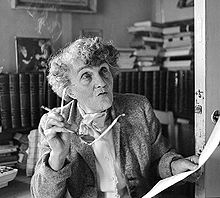Moa Martinson
Moa Martinson (birth name: Helga Svarts) (born November 2, 1890 in Östergötland , † August 5, 1964 in Södermanland ) was a Swedish writer .
biography

The daughter of a poor textile worker spent her youth first in Norrköping and then as a kitchen helper in Stockholm . After her first marriage to Harry Johansson, a worker in a cement factory, she was a farm worker and lost her first husband to suicide as well as two of the five sons that resulted from this marriage in an accident.
In 1929 she married the writer Harry Martinson , who was just making his literary debut with the poetry collection "Spökskeppet" (The Ghost Ship). Inspired by reading the works of Fjodor Michailowitsch Dostojewski , Maxim Gorki and above all Martin Andersen Nexø , she began writing herself and made her literary debut in 1933 with the novel "Women and Apple Trees" (Kvinnor och äppelträd).
She attracted wider attention in particular through an autobiographical tetralogy that portrayed her own early misery and life in the proletariat . The novels belonged to this tetralogy
- "Mother marries", 1936 (Mor gifter sig)
- "Church Wedding", 1938 (Kyrkbröllop)
- "Roses of the King", 1939 (Kungens rosor)
- "Encounter with a poet", 1950 (Jag möter en diktare)
The marriage with Harry Martinson was divorced in 1941 .
Her other novels and stories , in which she also described the hard everyday life of factory workers, include:
- "Roggenwacht", 1935 (Rågvakt)
- "The women of Kolmården", 1937 (Drottning Grågyllen)
- "Way under the stars", 1940 (Vägen under stjärnorna)
- "Brandlilies", 1941 (Brandliljor)
- "The Army on the Horizon", 1942 (Armén vid horisonten)
- "The invisible lover", 1943 (Den osynliga älskaren)
In addition, she also published articles, poems, glosses and short stories in women's magazines.
Web links
- Biography and Bibliography ( Memento from January 3, 2014 in the Internet Archive )
- Moa Martinson in the culture magazine " Perlentaucher "
- Moa Martinson: "My mother gets married", 1988 , ISBN 0935312811 , Google Books
literature
- Antonius Lux (ed.): Great women of world history. A thousand biographies in words and pictures . Sebastian Lux Verlag , Munich 1963, p. 322.
- Anne Williams: “Tillträde till den nya tiden. Fem berättelser om när Sverige blev modernt; Ivar Lo-Johansson , Agnes von Krusenstjerna , Vilhelm Moberg , Moa Martinson ”, Eslöv, Edition Östling 2002, ISBN 91-7139-567-9
Individual evidence
- ↑ Martinson, Helga Maria (Moa). Retrieved March 2, 2019 (UK English).
| personal data | |
|---|---|
| SURNAME | Martinson, Moa |
| ALTERNATIVE NAMES | Svarts, Helga (maiden name) |
| BRIEF DESCRIPTION | Swedish writer |
| DATE OF BIRTH | November 2, 1890 |
| PLACE OF BIRTH | Östergötland |
| DATE OF DEATH | 5th August 1964 |
| Place of death | Södermanland |

